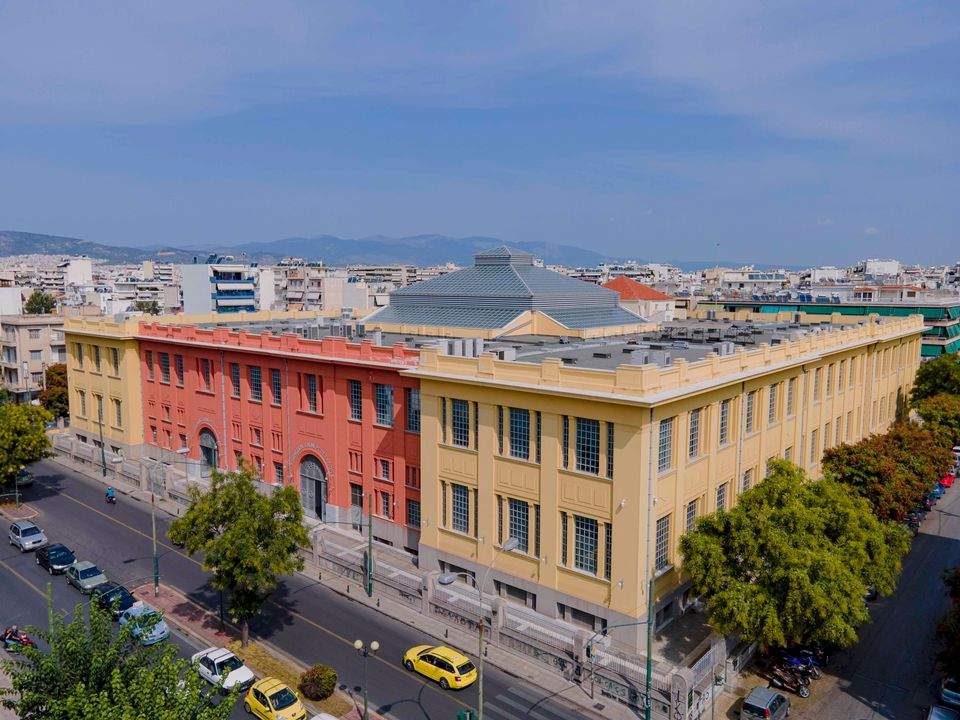Greece, a large tobacco factory in Athens will become a major cultural center
In Athens, a large tobacco factory will be turned into a cultural center: this is the public Lenorman Street Tobacco Factory, built in 1928 and completed in 1930, a large building covering an area of 19,000 square meters. The structure was built by the state with the aim of housing cigar and cigarette making factories and packaging companies inside, as well as stores, offices, and halls where patrons could linger. The building was then, over the years, put to a variety of other uses: for example, it was a prison, a refugee reception center, and home to government offices (e.g. of the Ministry of Finance). In 1989, the building was declared a protected monument by the Ministry of Culture. Today, half of the complex is unused, while the half in use houses the Library of the Hellenic Parliament.
In 2008, the facade was restored, while in 2016 the atrium roof, made of glass and steel, underwent an intervention. Now, as anticipated, there is the idea of turning the unused space into a cultural center.The conversion of the space is one of the many initiatives Greece is undertaking to celebrate the two hundredth anniversary of the 1821 revolution, at the end of which the country managed to gain independence from the Ottoman Empire. This is a crucial date for Greece because it is believed to be the beginning date of the modern Greek state.
The operations that will transform the Lenorman Street factory into a cultural center are made possible by the Neon Foundation, established in 2013 by collector Dimitris Daskalopoulos, which will finance the operation by providing one million euros.The work, which is being overseen by the Parliament’s technical services department, involves dismantling unused material, repairing and cleaning the rooms, renovating the rooms, equipping them with the necessary infrastructure to host exhibitions and events, and improving the air conditioning system. In addition, work is planned to upgrade electrical and plumbing systems and strengthen security measures, as well as to equip the entire center with a wi-fi network that will be accessible to visitors. Resources will also be used to purchase furniture for the new center.
The center is expected to open in June 2021, the date for which the first exhibition is scheduled to open, which will be titled Portals and curated by Elina Kountouri, director of the NEON foundation, and Madeleine Grynsztejn, director of the Museum of Contemporary Art in Chicago. This will be an exhibition very much in theme with the 200th anniversary celebrations of the revolution because it will talk about how new realities were formed and shaped eras precisely through uprisings or revolutionary movements. Forty contemporary artists, both Greek and foreign, will participate, with also prominent names such as those of Danh Vo, Michael Rakowitz, and Glenn Ligon.
“In 2021, NEON, in collaboration with the Hellenic Parliament,” says Elina Kountouri, "will present an international exhibition of contemporary art entitled Portals. The exhibition will try to emphasize how this moment in history is taking us through a ’portal.’ When we come out of it, we will need to reaffirm, for the sake of future generations, our commitment to certain values: law, human rights, democracy. The global scale of these challenges and the consequences of the pandemic make this reaffirmation imperative."
“In 2020,” Madeleine Grynsztejn declares instead, “the global community has been torn apart by a paradox: human beings, forced to isolate themselves from others, have become very aware of their interdependence. Forced to stay at home, they immediately found themselves in a hyper-localized environment, inversely proportional to the deeply connected and internationally oriented world. Physical connections and life-affirming social necessity became potentially deadly. This moment of paradox has led to many revelatory truths and accelerated changes. Contemporary art is the fuel of this evolution. In fact, art is crucial in moments like these because it enlightens us about who we are, shapes our experiences, broadens our perspectives, and guides us toward the society we would like. NEON founder Dimitris Daskalopoulos has always understood the powerful role of art and culture, and his organization is perfectly suited to convey this power. As Pritzker Director of the Museum of Contemporary Art Chicago, I am honored to have been invited by NEON’s director, Elina Kountouri, to curate this exhibition with her. The venue for this exhibition, what was once the Athens Public Tobacco Factory, now home to the Library of the Hellenic Parliament, is significant because of its deep economic, political, intellectual, and historical roots. Connections that will also be explored because of the opening of the exhibition on the bicentennial of the liberation of Greece in 1821. Contemporary art thrives in such a deeply relevant context; it marries the past to the present, reconciles current paradoxes and points to the future.”
Pictured is the Lenorman Street tobacco factory. Ph. Credit Giorgos Charisis
 |
| Greece, a large tobacco factory in Athens will become a major cultural center |
Warning: the translation into English of the original Italian article was created using automatic tools. We undertake to review all articles, but we do not guarantee the total absence of inaccuracies in the translation due to the program. You can find the original by clicking on the ITA button. If you find any mistake,please contact us.



























